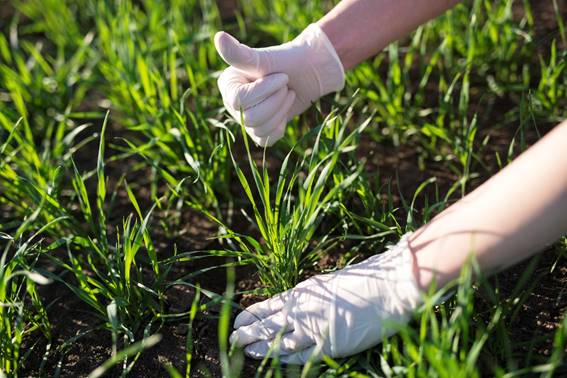Currently, agriculture faces a series of challenges, from efficient weed management to preserving soil health. In this context, glyphosate, a widely used herbicide, has been the subject of debate and controversy.
At Virkar Group we want to explore with our readers the benefits of glyphosate in agriculture and how its application in direct seeding can contribute to crop success.
Glyphosate and the Effective Control of Weeds
One of the most obvious advantages of glyphosate is its effectiveness in weed control. This herbicide works by inhibiting a key enzyme in plant growth, causing the rapid breakdown of plant cells. This means that glyphosate can eliminate a wide range of weeds, including those that are resistant to other herbicides.
Currently, in agriculture, weeds can compete with crops for nutrients and water, and effective week control is essential to ensure good yields. The proper application of glyphosate allows farmers to keep fields clean and reduce unwanted weeds.
Soil Conservation in Direct Seeding:
The agricultural practice of Direct Seeding aims to minimize soil disturbance by planting without prior tillage. This technique offers significant benefits for soil conservation, such as reducing erosion and improving soil structure. In this context, glyphosate plays an important role by facilitating direct seeding.
The application of glyphosate before direct seeding helps eliminate existing vegetation, creating a clean seedbed for seeding crops. This not only improves the efficiency of the seeding process but also contributes to the long-term conservation of soil health.
Reduced Dependence on Tillage
By enabling direct seeding, glyphosate reduces dependence on soil tillage. Traditional tillage involves turning and plowing the soil before planting, which can be effective for weed control but can also cause nutrient loss, soil erosion, and degradation of soil structure.
Thanks to glyphosate, direct seeding helps reduce these problems by allowing the preservation of soil cover and organic matter. This has long-term benefits, as healthy soil is essential for the ongoing success of agriculture.
Efficiency in Crop Management
Glyphosate also contributes to efficiency in crop management. By facilitating direct seeding, the time and resources needed to prepare fields for planting are reduced. This is very beneficial for farmers by saving operational time, and it also provides economic and environmental savings.
If glyphosate is applied efficiently, farmers will optimize their agricultural practices, minimizing negative environmental impact and improving the sustainability of agricultural production.
Improvement in performance
The combination of weed control, soil conservation, and efficient crop management has a positive impact on crop yields. Cleaner fields and soil conservation provide a favorable environmental for plant growth and development, resulting in more abundant and higher-quality harvests.
It is important to emphasize that, although glyphosate offers significant benefits, its use must be managed responsibly. By following dosage and application recommendations, as well as staying informed about local and national regulations, farmers can have a valuable ally for their crops.
Benefits and Responsibility In search of Balance
When glyphosate is used responsibly and good agricultural practices are followed, the benefits it offers are substantial for agriculture and direct seeding. From effective weed control to soil conservation and efficiency in crop management, this gerbicide has become a valuable tool for farmers.
It is essential that farmers, and the industry as a whole, closely follow research and regulations related to glyphosate in order to ensure a balance between agricultural benefits and environmental responsibility.
